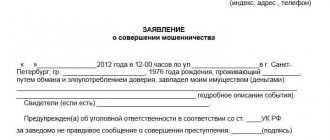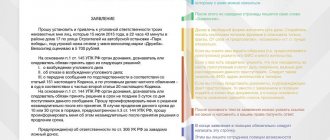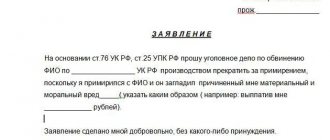The problem of insulting and spreading false information about others is a universally recognized act of anti-social nature. To legally resolve issues related to slander, you can file a statement of slander to the police, the sample of which is not fixed. If complicated situations arise related to factors of slander on the part of officials or other persons, it is possible to file a statement of slander with the prosecutor's office, the sample of which is similar to the form of application submitted to the police.
What is libel in the Criminal Code of the Russian Federation?
Not everything that is generally considered slander in society is criminally punishable, so we will analyze this concept according to the Criminal Code.
Slander is understood as the dissemination of knowingly false information that discredits the honor and dignity of another person or undermines his reputation.
Each word of this concept has its own meaning:
- falsity implies a discrepancy between the reality of the disseminated information;
- knowledge means that the perpetrator knows that the information he provides regarding the victim does not correspond to the real state of affairs;
- Distribution means communicating information by any means to at least one person;
- defamatory , exposing him in a negative light, characterizing him unflatteringly.
If all these signs are present in the crime, you can consider the possibility of bringing the offender to criminal liability under the Criminal Code of the Russian Federation.
Other conditions must also be met:
- the slanderer is 16 years of age or older;
- offender and victim – only individuals;
- direct intent to commit a crime, when the perpetrator clearly understands that his act is illegal, knows about its possible consequences and wants them to occur for the victim.
Criminal liability
Article 128.1 of the Criminal Code of the Russian Federation includes 5 parts that define penalties depending on how the libel is spread and its content.
Libel may entail:
- a fine in the range of 5 thousand - 5 million rubles, or in the amount of income for a period from 2 weeks to 3 years;
- from 60 to 480 hours of compulsory work .
If the court finds the offender guilty and imposes a fine on him as punishment, it will be turned into the income of the state, not the victim.
Read more: Article and punishment for libel
The essence of the crime
The crime consists of deliberately transmitting knowingly false information to third parties. A slanderer, through deliberate actions, harms a person’s reputation, undermines public trust, discredits one’s dignity and good name, and denigrates one’s moral character.
Article 128.1 of the Criminal Code of the Russian Federation considers the following types of false information, for the dissemination of which the culprit bears criminal liability:
- distorted data about a citizen’s personal life, protected by his right to confidentiality, prescribed in Russian legislation;
- false information about misconduct and illegal activities;
- unverified facts of participation in dubious illegal activities;
- false evidence of discreditable connections, etc.
In domestic legal practice, court proceedings regarding libel spread over the Internet have become more frequent. Users post obscene photographs on social networks, accompanied by vulgar comments. The difficulty in considering such claims lies in the anonymity of the source of compromising information. To identify the culprit, specialists are brought in to identify him using his IP address.
Where to file a libel claim
According to the legislation of our country, there are 2 types of liability for libel:
- Criminal law , when the perpetrator is brought to criminal responsibility and serves the sentence imposed by the court verdict. Such liability for libel can be achieved in two different ways - by contacting the police or the magistrate's court with a statement to initiate a criminal case. The method depends on clearly defined circumstances in the law, which we will consider in detail.
- Civil law , when the perpetrator compensates for the damage caused by slander in monetary terms by decision of the district court .
Thus, the authority to which you should apply for prosecution directly depends on the method of defense chosen by the victim.
How to write a statement correctly
A victim of slanderous attacks can seek help from the police or prosecutor's office. The rules for filing an application with these authorities are slightly different.
The following algorithm should be followed:
- When contacting the police station, the details of the territorial unit must be indicated. Information about the manager (full name, position and title) should be written in the header of the document.
- A complaint about slander to the prosecutor's service is accompanied by an indication of the body registering the statement.
- The police office issues a special coupon confirming the citizen’s application. It can be used to form an evidence base when filing a lawsuit.
- The receipt of a complaint by the prosecutor's office is certified by a special stamp indicating the date and person in charge. Such a mark is placed on a copy of the written statement that remains with the victim.
Tips for writing an application correctly.
Standard samples of documents are located on information boards or in the office of law enforcement agencies. If you need it you can here.
Document structure and sample
The legislative framework has not yet developed an official form for complaining about defamation to the police. Therefore, an injured citizen who discovers the fact of slanderous attacks against him can write a statement in any form.
When registering, you must adhere to the following rules:
- the introductory part contains the name of the territorial unit of the law enforcement agency and information about its head;
- First there is information about the applicant, including full name, place of residence and registration;
- the main part of the document contains a description of the established facts of slander and methods of its dissemination;
- the application indicates the person suspected of the offense, with a request to hold him accountable, his personal data and actual address of residence are indicated;
- The registration is completed with the date and signature of the victim.
It is advisable to seek assistance in filing a complaint from a police officer. Emotional statements and drawn-out descriptions are unacceptable in an official document. The application must be short and concise, containing only the required information.
Nuances of document preparation.
The police officer informs the applicant about the likelihood of criminal prosecution for false denunciation. The latter puts his signature under the appropriate mark, which is required to be made by a law enforcement officer.
Deadlines for submission and review
If an attack on honor and dignity is detected through slander and deliberate dissemination of distorted information, it is recommended to immediately file a statement of slander with law enforcement agencies. It’s easier for the police to investigate a crime “without a trace.”
The legislative framework establishes a statute of limitations for this category of offenses. It is 2 years. After the expiration of the stated period, even with a strong evidentiary platform, it is impossible to bring the perpetrator to justice. Therefore, the victim filing a complaint with the police must meet the specified deadline to achieve a result.
Within three days from the moment of official registration of the document at the police station, a procedural decision is made on the case. In case of difficulties accompanying the implementation of the measures required for the investigation, the review time is extended to 10 days. In some cases, when the accused person files a counter-statement, the period of proceedings is extended to 30 days.
Reporting libel to the police
A statement about any crime, including a statement about slander, must be accepted at any territorial police department; this is enshrined in law.
However, with regard to defamation, not in all cases, police investigators must initiate and investigate a case. This depends on a number of conditions, including the circumstances of the crime.
"Simple" slander
“Simple” is considered to be slander committed without aggravating circumstances, liability for which is established by part one of Art. 128.1 of the Criminal Code of the Russian Federation. Criminal prosecution for it takes place in private, these are private prosecution cases .
This means that prosecution under Part 1 of Art. 128.1 of the Criminal Code of the Russian Federation occurs state. authorities, only if the slander took place against a person who is unable to defend his rights:
- due to a helpless, dependent state , for example, in relation to an elderly person or a minor with physical or mental disabilities;
- due to slander by an unknown person.
In such circumstances, a victim statement is not necessary. Even after the police receive a report of such slander, an investigation is carried out and a criminal case should be initiated or refused if the act does not have signs of a crime.
In all other cases, the police do not have the authority to initiate cases under Part 1 of Art. 128. They belong to the magistrate's court. Such cases are initiated only in private at the request of the victim, who applies to initiate a case in the magistrate’s court, supports the accusation, and presents evidence.
However, this does not exclude the possibility of filing a statement of libel with the police in order to collect as much necessary data as possible for going to court.
Such a statement must also be subject to a pre-investigation check in the usual manner, and if there are all signs of slander, decisions can be made:
- on the transfer of inspection materials to the magistrate's court and upon completion of the inspection activities, the desire of the victim for the offender to be punished for his act will remain;
- about the refusal to initiate a criminal case, since there is no statement from the victim under paragraph 5 of Part 1 of Art. 24 of the Code of Criminal Procedure of the Russian Federation, if he does not wish to continue the process.
You should know that a statement of defamation, which the victim writes to the police, is not enough to initiate a criminal case by the magistrate court. Having received such materials, the court returns the application to the victim, indicating its shortcomings and the deadline for eliminating them. In order for the trial to begin, you need to prepare a document in accordance with the requirements of Art. 318 Code of Criminal Procedure of the Russian Federation.
If, during the pre-investigation check, a case of slander by an unidentified person is established, further proceedings take place in private with the transfer of the check materials to the magistrate's court.
If the slanderer is identified during the investigation of the case, the investigation into him continues in accordance with the general state procedure. authorities, the case is sent to court after the end of the investigation.
Qualified libel
In parts 2-5 tbsp. 128.1 of the Criminal Code of the Russian Federation establishes stricter criminal liability for qualified types of this crime. These include slander:
- in a public work, speech, demonstration of which takes place publicly in the media;
- using official position;
- containing information about a person’s disease that is dangerous to others or accusing him of a sexual crime;
- accusing of a serious, especially serious act prohibited by the Criminal Code.
Criminal prosecution for libel committed under such circumstances is carried out by employees of the police investigation unit and the prosecutor's office in a public manner.
How to file a statement of defamation to the police - sample
There are no special requirements for reporting defamation to the police. It needs to briefly outline the circumstances of the incident, a request for an investigation, and to bring the perpetrator to justice. This document is written to the head of the police department with the obligatory indication of the applicant’s data.
libel reports to the police
In order to save time, you need to submit a statement to the police department at the place where it was committed .
Submission deadline
The crime is classified as a minor offense. Therefore, the statute of limitations for criminal liability for libel is 2 years from its commission. For the offender to be punished under Art. 128.1 of the Criminal Code of the Russian Federation, you should contact the competent authorities at any time within this period. After this, there can be no punishment for the offender.
Verification period
A procedural decision on a statement of defamation to the police must be made 3 days after its registration. If it was not possible to carry out all the necessary measures, the period can be increased to 10 days, in special cases up to 30.
Based on the results of verification activities, the following may be possible:
- a criminal case has been initiated under any part of Art. 128.1 of the Criminal Code of the Russian Federation, depending on the circumstances of the commission of the act;
- it was refused to initiate it due to the lack of evidence, the event of the crime, or due to the lack of a statement from the victim, if he decided to take it away;
- transfer of the message and material of the investigation on jurisdiction to the magistrate's court for initiation and consideration of the case.
The applicant has the right to file a complaint against each of the decisions with the prosecutor or in court if he does not agree with it.
How is slander proven?
Defamatory information causes moral and material harm to a person. His reputation suffers, clients and contractors do not want to continue maintaining relationships. Sometimes dismissal from a position follows. In such a situation, it is necessary to defend yourself. And the first stage will be collecting evidence. For information: the victim can contact various authorities. Explanations of the RF Armed Forces divide them into two groups:
- Law enforcement agencies are engaged in punishing the offender. These include:
- police;
- prosecutor's office
The court is considering stopping the spread of false information and compensation.
Evidence will be required in all instances. Therefore, the victim needs to take care of their availability. Moreover, the evidence base itself is structurally divided into two sections:
- Confirmation of the presence of information harmful to the victim. And also proof of its falsity and unreliability.
- Identifying the motive for intentionally committing an unlawful act. It can be: moral - causing suffering to the slandered;
- material - receiving benefits from false information.
Important: before submitting an application to the appropriate authority, you should think about how the matter will turn out. If the prosecutor or court refuses to satisfy the request, the accused will also have the right to file a counterclaim for libel.
Witness testimony
Defamatory information disseminated orally must be confirmed. The best way to do this is to involve witnesses. They are people who heard the slanderer. To prepare materials for law enforcement agencies, you should compile a list of witnesses with residential addresses and contact information. Please note: people will have to testify under oath in court. They will be warned about the spread of false information. It is advisable to notify those who agree to testify in favor of the plaintiff about the procedure.
Linguistic expertise
Involving experts in the case increases the chances of winning the process.
Linguistic research is carried out only by specialists who have received state permission. It is issued based on verification of the diploma and qualification level of the applicant. Expert services are paid (from 10 thousand rubles). The specialist analyzes the materials to identify phrases that discredit the applicant’s dignity and harm him. In this case, a person must correctly set the task. The expert is provided with:
- materials confirming slanderous information: oral speech must be carefully recorded;
- SMS messages;
- articles;
- letters;
- videos and more;
Hint: the task registry can be expanded and supplemented. As a result, the specialist will issue a document containing the results of the analysis of the slanderer’s words.
If there are no witnesses
A different situation arises if no one is able to confirm the spoken lie. The case lies in the definition of criminal libel. Logically:
- dissemination is persecuted ;
- if no one received it, then there is no composition.
However, this is not quite true. After all, there is a possibility that the slanderer spreads information in a circle with which the victim does not interact. In such a situation, you need to show ingenuity and foresight:
- be patient;
- prepare a voice recorder;
- record the slanderer's speech when he tries to speak again.
Any visual sources are accepted as evidence of a criminal act. If the message was published online, you should immediately take screenshots of the screen. You can take photographs of emails, notes, and other offensive remarks.
Hint: do not provoke the offender. This method will be deemed unsuitable, and the case will be closed.
Application to initiate a criminal case in court - sample
Criminal cases of private prosecution, including “simple” libel, are jurisdictional before magistrates at the place where the unlawful act was committed.
The court may consider an application to initiate a case if :
- there was “simple” slander;
- the offender is known;
- the applicant can defend his rights himself;
- the application meets other provisions of Article 318 of the Code of Criminal Procedure of the Russian Federation.
Compilation rules
Such a statement must indicate:
- name of the court;
- information about how the slander occurred, place, time, circumstances;
- request to accept the case for proceedings;
- information about the victim, identification documents;
- information about the alleged offender;
- list of witnesses to be called;
- applicant's signature.
statements of libel in the magistrate's court
It must be submitted with copies for those whom the victim wishes to prosecute.
Review period
If all the requirements are met by the applicant, the court will accept the case for proceedings, explaining to him the rights of a private prosecutor . 7 days after receipt of the application:
- the alleged offender is summoned to court;
- gets acquainted with the case;
- receives a copy of the application;
- the rights of the defendant are explained to him;
- find out who should be called and heard as defense witnesses.
Further proceedings in the case take place in accordance with Chapters 35-39 of the Code of Criminal Procedure of the Russian Federation.
Limitation periods
The legal framework specifies the statute of limitations for filing a defamation claim. After two years from the date of commission of the offense, the victim loses the right to bring to justice the person who violated the law prescribed in Art. 128.1 of the Criminal Code of the Russian Federation.
There is no time limit for filing civil claims to refute false information and pay moral compensation. There are no statutes of limitations for them, with the exception of information published in the media. In such cases, the application must be submitted no later than one year from the date of publication.
A claim for compensation for damages must be submitted to law enforcement agencies within three years from the time the slanderous attacks were discovered. After this period, even with a strong evidence base, the perpetrator will escape punishment.
Statement of claim to court - sample
You can defend your honor, dignity, and business reputation in civil proceedings by filing a lawsuit in court according to the rules of Art. 152 of the Civil Code of the Russian Federation.
According to the general rules of jurisdiction at first instance, such claims are considered by district courts at the place where the defendant lives.
In a lawsuit, the victim of slander may demand:
- refute false and defamatory information disseminated by the defendant;
- to pay damages;
- compensate for moral damage.
statement of claim to court
Claims to refute disseminated information and compensate for moral damage caused by this can be filed at any time ; they have no statute of limitations .
The exception is requirements related to the dissemination of information in the media . The statute of limitations for them is one year from the date of publication.
The general statute of limitations for claims for damages is 3 years.
Litigation on claims for the protection of honor and dignity occurs in accordance with the general procedure. Each side presents evidence of its arguments and a refutation of the opponent’s arguments.
The plaintiff must prove that it was the defendant who disseminated the information and its defamatory nature. The defendant must prove that the information he disseminated is true.
To satisfy the claims, a combination of three conditions must be established:
- defamatory nature of the information;
- its distribution;
- discrepancy with reality.
In the absence of all or at least one of these conditions, one should not count on a favorable outcome for the plaintiff.
Criminal and civil methods of defending one’s honor and dignity are not mutually exclusive. Refusal to initiate a criminal case for libel, termination of the case for any reason, or any verdict is not an obstacle to filing a lawsuit in court in accordance with the provisions of Art. 152 of the Civil Code of the Russian Federation.
Punishment for libel
The degree of punishment for libel depends on the severity of the crime. The law stipulates what will happen for a statement for slander to the police (what punishment the slanderer faces):
- “Simple” slander without aggravating circumstances is punishable by compulsory labor or a fine; the defendant will have a criminal record on his record.
- “Qualified” slander, with aggravating circumstances, when disseminated through the media, is fined up to a million rubles and compulsory labor for up to 240 hours.
- Defamation using official position is punishable by a fine of 2 million rubles.
- For lying about committing a serious, especially serious crime or a crime of a sexual nature, the defendant pays a fine of up to 5 million rubles.
- For lying about the presence of a dangerous disease, the slanderer will be fined 3 million rubles.
It is important to understand that the fine imposed by the court is paid to the state, not the victim. If the victim believes that he needs compensation for causing moral damage, he indicates this in the statement of claim.
About the author of the article
Anastasia Fedorchenko I value my time and nerves. Therefore, I am studying ways to protect them in any situation. I share my best finds with you.
Contacting the prosecutor's office
Despite the popular belief that a statement of libel should be filed with the prosecutor's office, this should not be done , since the prosecutor's office:
- do not conduct pre-investigation checks on reports of crimes;
- do not monitor compliance with the law by individuals subject to liability for libel, and do not have the authority to take response measures against violators;
- do not replace other federal bodies whose powers include conducting inspections based on the facts stated in the appeals. In this case, the authorities authorized to make decisions and bring the perpetrators to justice will be the police and the court;
- As a rule, they do not participate in civil cases for compensation for damage to honor and dignity.
Having received an appeal containing information about slander against the applicant, the prosecutor is obliged to forward it according to his jurisdiction within 5 days from the date of registration. That is, in fact, filing a slander claim with the prosecutor’s office will take time.
In this case, the prosecutor is authorized to :
- carry out checks on complaints against police officers who carried out the check on the statement of slander, and the decisions they made;
- in case of initiation and investigation of a criminal case by police investigators, approve the indictment and subsequently support the charge in the criminal case in court.
Did the article help you?
Not really
Submission order
The appeal must be brought in person to the office of the selected authority. The following subtleties should be kept in mind:
- one statement is written to the police;
- It is advisable to bring two copies to the prosecutor's office;
- and in the magistrate's court - three.
All evidence will have to be reproduced only for the court. Three identical packages of documents are submitted to this institution:
- one for the judge;
- the second for the defendant;
- the third remains with the plaintiff.
The employee will accept two packages. Within three days they will undergo a preliminary check for identity and correctness of composition. Only after this will the applicant be notified of the further progress of the proceedings. The plaintiff's copy is marked with acceptance (court stamp).
Hint: if the court does not accept the claim, then it should be worked out again and resubmitted. The reason for refusal is usually a violation of the drafting form.










